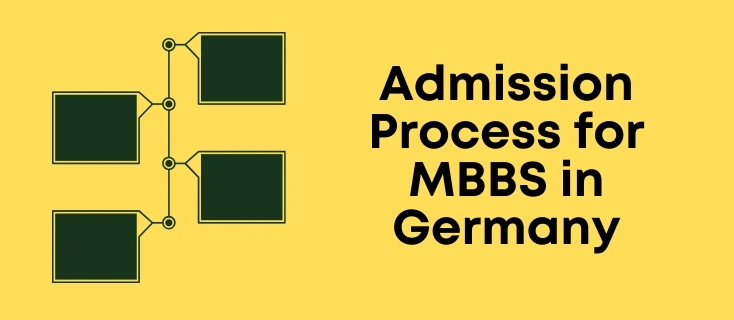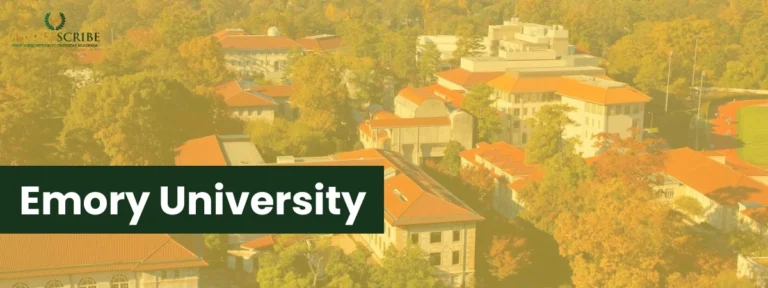Pursuing a Bachelor of Medicine, Bachelor of Surgery (MBBS) degree is a dream for many Indian students. With the increasing competition and limited seats in Indian medical colleges, many students are looking abroad for quality education. Germany has emerged as a popular destination for Indian students seeking an MBBS degree due to its world-class education system, affordable tuition fees, and excellent healthcare infrastructure. In this topic, we’ll discuss in detail about MBBS in Germany for Indian students.
15 Reasons why choose MBBS in Germany

Here are the reasons why Germany is the best option for aspiring students:
- Low Cost: One of the top reasons to consider MBBS in Germany for Indian Students is the low or no tuition fees at public universities, making it a cost-effective option.
- Top-Notch Education: German medical schools are known for excellent teaching and high standards.
- Modern Facilities: You’ll study in advanced labs and hospitals with the latest technology.
- Global Degree: An MBBS from Germany is respected worldwide, helping you work anywhere.
- Great Healthcare: Learn in one of the best healthcare systems in the world.
- Research Focus: Germany is a leader in medical research, offering many opportunities to explore.
- Safe Country: Germany is a safe place with a friendly, multicultural environment.
- Part-Time Work: You can work part-time while studying to help with living costs.
- Stay After Graduation: You can stay in Germany for up to 18 months after graduating to find a job.
- EU-Wide Recognition: Your degree will be valid across all European Union countries.
- Diverse Culture: Meet people from all over the world and experience different cultures.
- Easy Visa Process: The process of a German Visa is not as complex as the other countries.
- Strong Economy: Germany has a stable economy with many job opportunities.
- Scholarships: There are many scholarships available for international students.
- High Quality of Life: Enjoy a comfortable lifestyle with excellent public services and infrastructure.
Also Read: Masters in Public Health in Germany
MBBS in Germany?
MBBS in Germany is equivalent to the German medical degree known as “Medizinstudium.” The program is designed to provide students with a comprehensive understanding of medical science, clinical skills, and patient care. The course duration is typically six years, divided into pre-clinical, clinical, and practical training phases.
In Germany, medical education is highly regulated, and the degree is recognized worldwide. Graduates are eligible to practice medicine in Germany and other countries, provided they meet the respective licensing requirements. The program is taught in German, although some universities offer courses in English, making it accessible to international students.
The program duration is 6 – 7 years, consisting of three stages:
| Stage | Duration | Description |
| Preclinical Phase (Vorklinik) | 2 years | Covers basic medical sciences such as anatomy, physiology, and biochemistry. |
| Clinical Phase (Klinik) | 3 years | Involves hospital-based training, clinical studies, and patient interaction. |
| Practical Year (Praktisches Jahr – PJ) | 1 year | Hands-on training in hospitals under professional supervision. |
| State Examination (Staatsexamen) | Final Exam | Qualifying exam to obtain a medical license. |
After passing the State Examination, students receive their medical degree and can start their medical practice in Germany or apply for postgraduate specializations.
Want to Study in Germany?
Start your journey with Successcribe’s free expert guidance
Book a Free Session NowEligibility Criteria for MBBS in Germany

To pursue MBBS in Germany, Indian students must meet specific eligibility criteria. These criteria may vary slightly depending on the university, but the general requirements are as follows:
| Criteria | Details |
| Academic Qualification | To pursue MBBS in Germany for Indian Students, applicants must have a minimum of 60% in Physics, Chemistry, and Biology in their 10+2 exams |
| German Language Requirement | B2/C1 Level in German (for German-taught courses). |
| NEET Exam | NEET Exam is mandatory for all Indian students studying abroad. |
| Studienkolleg | Required for students with 12 years of schooling (one-year preparatory course). |
| Age Requirement | Minimum 17 years old. |
- Academic Qualifications: Students must have completed their 10+2 education with Physics, Chemistry, and Biology as core subjects. A minimum aggregate score of 60% in these subjects is typically required, though top universities may demand higher percentages.
- NEET Qualification: As mentioned earlier, Indian students must qualify for NEET to be eligible for MBBS in Germany.
- Age Requirement: Applicants must be at least 17 years old
- Language Proficiency: Since the medium of instruction is primarily German, students must demonstrate proficiency in the German language. Most universities require a B2 to C1 level certification in German. Some universities may also accept English proficiency tests like IELTS or TOEFL if the program is offered in English.
- Entrance Exam: Some German universities may require students to clear an entrance exam, such as the Test for Medical Studies (TMS), which assesses their aptitude for medical studies.
- Studienkolleg: If a student’s academic qualifications do not meet the German education system’s requirements, they may need to attend a Studienkolleg (preparatory course) before applying for MBBS.
Also Read: Masters in Psychology in Germany
NEET Exam Requirement for MBBS in Germany

The National Eligibility cum Entrance Test (NEET) is a mandatory examination for Indian students seeking admission to medical courses abroad, including Germany. NEET serves as a qualifying exam for Indian students who wish to pursue MBBS in Germany. While German universities do not explicitly require NEET scores, Indian students must clear NEET to be eligible for the Medical Council of India (MCI) screening test, which is necessary for practicing medicine in India after completing their degree abroad.
Since 2018, the Medical Council of India (MCI) has made it mandatory for Indian students to qualify NEET before applying for MBBS abroad. NEET is required to:
- Secure admission to German medical universities.
- Get MCI recognition for the MBBS degree when returning to India.
| NEET Requirement | Details |
| Minimum NEET Score | While there is no specific NEET score requirement for German universities, a higher score can improve your chances of admission |
| NEET Validity | 3 Years (for studying abroad). |
| FMGE Requirement | Indian students must pass the Foreign Medical Graduate Examination (FMGE) if they want to practice in India after MBBS in Germany. |
NEET qualification is mandatory for MBBS in Germany for Indian Students, as it is required for both admission and MCI recognition upon returning to India.
Also Read: Best business schools in Germany
What if I Don’t Qualify for NEET?
If you do not qualify for NEET, you cannot pursue MBBS in Germany or any other country as per NMC regulations. NEET is mandatory for Indian students who wish to study medicine abroad and practice in India.
MBBS in Germany Fees

One of the biggest advantages of MBBS in Germany for Indian Students is the absence of tuition fees at public universities, with only nominal semester fees to cover administrative costs. The semester fee typically ranges from €150 to €400.
Private universities, on the other hand, may charge tuition fees, which can range from €10,000 to €20,000 per year. Additionally, students must budget for living expenses, including accommodation, food, transportation, and other personal expenses. On average, the cost of living in Germany is around €800 to €1,200 per month, depending on the city and lifestyle
| Type of University | Tuition Fees (Per Year) | Other Costs (Semester Fees, etc.) |
| Public Universities | €0 – €500 | €150 – €300 per semester. |
| Private Universities | €5,000 – €15,000 | Additional administrative costs. |
Cost of Living in Germany for MBBS Students
| Expense | Monthly Cost (€) | Yearly Cost (€) |
| Housing | €300 – €600 | €3,600 – €7,200 |
| Food | €150 – €250 | €1,800 – €3,000 |
| Transport | €70 – €100 | €840 – €1,200 |
| Miscellaneous | €100 – €200 | €1,200 – €2,400 |
| Total Estimated | €850 – €1,200 | €10,200 – €14,400 |
Scholarships for MBBS students in Germany
Studying MBBS in Germany for Indian Students is affordable compared to other countries, but scholarships can make it even easier for Indian students to manage their expenses.
| Scholarship Name | What is Cover | Eligibility |
| DAAD Scholarships | Tuition fees, monthly stipend (€850-€1,200), travel allowance, health insurance. | Excellent academic record, B2/C1 level German language proficiency. |
| Erasmus+ Scholarships | Tuition fees, travel costs, monthly stipend (€1,000-€1,500). | Open to international students enrolled in Erasmus+ partner universities. |
| Heinrich Böll Foundation Scholarship | Monthly stipend (€850-€1,200), tuition fees (if applicable). | Strong academic record, interest in environmental and social issues. |
| Konrad-Adenauer-Stiftung Scholarship | Monthly stipend (€850-€1,200), tuition fees (if applicable). | Leadership potential, strong academic record, interest in politics and society. |
| Deutschlandstipendium (Germany Scholarship) | Monthly stipend (€300), no tuition fees. | Academic excellence, social engagement, and personal achievements. |
| Friedrich Ebert Foundation Scholarship | Monthly stipend (€850-€1,200), tuition fees (if applicable). | Strong academic record, social and political engagement. |
| Charité – Universitätsmedizin Berlin Scholarships | Financial support for tuition and living expenses. | Academic merit, research potential. |
| Humboldt University Scholarships | Tuition fee waivers, monthly stipends. | Academic excellence, financial need. |
Top Universities/Colleges for MBBS in Germany
Some of the top universities for MBBS in Germany include:
- Heidelberg University
- Charité – Universitätsmedizin Berlin
- Ludwig Maximilian University of Munich (LMU)
- University of Tübingen (Eberhard Karls Universität Tübingen)
- Technical University of Munich (TUM)
- University of Hamburg (Universität Hamburg)
- Hannover Medical School
- Universität Hamburg
- University of Freiburg (Albert-Ludwigs-Universität Freiburg)
- University of Bonn (Rheinische Friedrich-Wilhelms-Universität Bonn)
Apply to Top German Universities
Make your application simple and stress-free with Successcribe
Get Expert Help NowMBBS Curriculum Overview
The MBBS curriculum in Germany is designed to provide students with a comprehensive understanding of medical science and clinical practice. The curriculum for MBBS in Germany for Indian Students is regularly updated to reflect the latest medical advancements. The program is divided into three phases:
- Pre-Clinical Phase (2 years): This phase focuses on the basic sciences, including anatomy, physiology, biochemistry, and medical terminology. Students also learn the fundamentals of patient care and medical ethics.
- Clinical Phase (3 years): During this phase, students study clinical subjects such as internal medicine, surgery, pediatrics, obstetrics, and gynecology. They also gain hands-on experience through clinical rotations in hospitals and clinics.
- Practical Training (1 year): The final year of the program is dedicated to practical training, where students work in hospitals under the supervision of experienced doctors. This phase is known as the “Praktisches Jahr” and is a crucial part of the medical education in Germany.
| Phase | Duration | Subjects |
| Preclinical Phase | 2 Years | Anatomy, Physiology, Biochemistry, Biophysics, Medical Mathematics. |
| Clinical Phase | 3 Years | Pathology, Pharmacology, Internal Medicine, Surgery, Pediatrics, Obstetrics and Gynecology. |
| Practical Year | 1 Year | Clinical rotations in various medical specialties. |
Throughout the program, students are required to pass several exams, including the state examination (Staatsexamen), which is necessary for obtaining a medical license. The faculty involved in MBBS in Germany for Indian Students are often leading experts in their respective fields.
Also Read: How to get scholarship to study abroad
Is Studienkolleg Required for MBBS in Germany?
Whether you need to attend Studienkolleg depends on your academic qualifications. Here’s how it works:
When is Studienkolleg Required?
- If you have completed 12th grade from an Indian board, Studienkolleg is mandatory.
- If you have completed the first year of a medical-related bachelor’s degree in India, you may be exempt.
- If you have an IB (International Baccalaureate) or other recognized equivalent qualification, you may not need Studienkolleg.
What Does Studienkolleg Include?
Studienkolleg is divided into different courses based on the field of study. For MBBS, you will join the M-Course (Medical Course), which includes:
- Subjects: Biology, Chemistry, Physics, Mathematics, and German.
- Duration: 1 year (2 semesters).
- Final Exam: After completing Studienkolleg, you must pass the Feststellungsprüfung (FSP) to qualify for university admission
Benefits of Studienkolleg
- Prepares You for University: Studienkolleg helps you adapt to the German education system and improves your academic skills.
- Improves German Language Skills: Since MBBS in Germany is mostly taught in German, Studienkolleg helps you reach the required language level (B2/C1).
- Increases Admission Chances: Passing the Feststellungsprüfung (FSP) makes you eligible to apply for MBBS in Germany.
After MBBS PG Plans
After completing MBBS in Germany for Indian Students, many choose to pursue residency programs or return to India after clearing the FMGE exam. Germany offers a wide range of PG programs, including residency programs (Facharztausbildung) and master’s degrees in medical sciences.
- Residency Programs: These programs allow doctors to specialize in a specific area of medicine, such as cardiology, neurology, or orthopedics. The duration of residency programs varies depending on the specialization, typically ranging from 4 to 6 years.
- Master’s Degrees: Some students opt for a master’s degree in medical sciences, which focuses on research and academic pursuits. These programs are ideal for those interested in a career in medical research or academia.
- Returning to India: Indian students who wish to practice medicine in India after completing their MBBS in Germany must clear the Foreign Medical Graduates Examination (FMGE) conducted by the National Board of Examinations (NBE). Passing this exam allows them to register with the Medical Council of India (MCI) and practice medicine in India.
| Option | Details |
| Residency Programs | Specialization in fields like cardiology, neurology, etc. (4–6 years). |
| Master’s Degrees | Research-focused programs in medical sciences. |
| Returning to India | Must clear FMGE to practice in India. |
Do I Need to Learn German to Pursue MBBS in Germany?
Yes, learning German is essential for MBBS in Germany. Most programs are taught in German, and proficiency in the language is required for both academic and clinical purposes. Even if you enroll in an English-taught program, learning German is crucial for daily life and patient interactions. Many universities offer German language courses for international students.
Student Visa for MBBS in Germany
For those interested in MBBS in Germany for Indian Students, understanding the visa application process is crucial for a smooth transition. Indian students planning to study MBBS in Germany must obtain a student visa. Here’s a step-by-step guide to the visa application process:
| Step | Details |
| Admission Offer Letter | Secure an admission letter from a recognized German university. |
| Financial Proof | Show proof of €11,904 per year in a blocked German bank account. |
| Health Insurance | Valid health insurance coverage for the duration of stay in Germany. |
| Visa Application | Submit application to the German Embassy/Consulate with required documents. |
| Visa Interview | Attend an interview to discuss study plans and financial situation. |
- University Admission Letter: Obtain an official admission letter from a recognized German medical university.
- Proof of Financial Resources: Demonstrate the ability to finance education and living expenses. This typically involves depositing approximately €10,332 into a blocked account, ensuring around €861 per month for living costs.
- Health Insurance: Valid health insurance coverage is mandatory for all students throughout their stay in Germany.
- Language Proficiency Proof: Submit certificates proving proficiency in the German language, as required by the university.
- Visa Application: Apply for the student visa at the nearest German consulate or embassy, providing all necessary documentation and attending any required interviews
Admission Process for MBBS in Germany

The process of applying for MBBS in Germany for Indian Students is straightforward, requires careful planning and preparation. Below is a step-by-step guide to help Indian students navigate the process efficiently:
1. Research for the Universities
Germany has multiple medical universities, so students should research and shortlist institutions based on:
- Accreditation and ranking
- Language of instruction (most programs are in German)
- Admission requirements
- Location and living expenses
- Available scholarships
2. Learn the German Language
Since MBBS courses in Germany are taught in German, students must achieve proficiency at a B2 or C1 level. Steps to achieve this:
- Enroll in a German language course in India or Germany.
- Take language proficiency exams such as TestDaF or DSH.
- Practice by engaging with native speakers and German medical terminology.
3. Check Studienkolleg Requirement
- If your school qualifications are not equivalent to the German Abitur, you may need to complete a one-year preparatory course (M-Kurs) at a Studienkolleg.
- The M-Kurs focuses on science subjects required for medical studies.
- After completing Studienkolleg, students must pass the Feststellungsprüfung (FSP) exam to qualify for MBBS admission.
4. Prepare and Submit Your Application
Most German universities use the Uni-Assist portal to process applications. Key documents required:
- Academic transcripts (Class 10 and 12 marksheets)
- NEET scorecard
- German language proficiency certificate (B2 or C1 level)
- Motivation letter
- Letter of recommendation (if required)
- APS Certificate (mandatory for Indian students since 2022)
5. Obtain the APS Certificate
The Academic Evaluation Center (APS) certification is mandatory for Indian students applying for MBBS in Germany.
To obtain the APS certificate:
- Submit academic documents for verification.
- Pay the processing fee.
- Receive the certificate upon successful verification.
- The APS certificate is required for both university admission and visa applications.
6. Apply for a German Student Visa
Once you receive an admission letter, apply for a German student visa by submitting the following documents to the German Embassy:
- University admission letter
- APS Certificate
- Proof of language proficiency
- Blocked account confirmation (€11,208 per year as per 2024 requirements)
- Health insurance coverage
- Passport and visa application form
7. Travel to Germany and Enroll in University
Upon arrival in Germany:
- Register at the university and complete enrollment formalities.
- Obtain a residence permit from the local immigration office.
- Register with local authorities (Anmeldung) at the city hall.
- Open a German bank account if not already done.
- Begin your MBBS journey!
Application Statistics (2025)
| Category | Projected Data (2025) |
| Total Applicants | 50,000 |
| Total Admitted Students | 10,000 |
| Admission Rate | 20% |
| Average NC (Numerus Clausus) | 1.0 – 1.2 |
| International Applicants | 8,000 |
| International Students Admitted | 1,200 |
Recognition of Universities for MBBS in Germany
The medical universities in Germany are highly accredited and recognized by several prestigious medical governing bodies and organizations worldwide. This ensures that the MBBS degree awarded by German universities is valued globally, allowing graduates to practice medicine in various countries, including India.
Recognizing Bodies for MBBS in Germany
| Recognizing Bodies | Details |
| WHO (World Health Organization) | German medical universities are listed in the World Directory of Medical Schools (WDOMS), maintained by the WHO. This recognition ensures that the MBBS degree from Germany is valid and accepted worldwide. |
| UNO (United Nations Organization) | The United Nations acknowledges the high standards of medical education in Germany, making degrees from German universities globally respected. |
| FAIMER (Foundation for Advancement of International Medical Education and Research) | FAIMER recognizes German medical universities, ensuring that the quality of education meets international standards. This recognition is crucial for students planning to work or pursue further studies in countries like the USA. |
| Ministry of Education, Germany | The German Ministry of Education rigorously monitors and accredits medical universities in Germany to maintain the highest standards of education and research |
| WFME (World Federation for Medical Education) | The WFME accredits medical programs in Germany, ensuring that they meet global standards for medical education. This accreditation is essential for students planning to work or study in countries that require WFME recognition |
| NMC (National Medical Commission, India) | The NMC (formerly MCI) recognizes MBBS degrees from German universities, provided the university is listed in the World Directory of Medical Schools (WDOMS). Indian students must clear the Foreign Medical Graduates Examination (FMGE) to practice medicine in India after completing their MBBS in Germany. |
Also Read: Healthcare management in Germany
Why Recognition Matters?
- Global Acceptance: Degrees from recognized German universities are accepted worldwide, allowing graduates to practice medicine in multiple countries.
- Licensing Exams: Recognition by bodies like NMC, GMC, and USMLE enables graduates to appear for licensing exams in India, the UK, and the USA, respectively.
- Quality Assurance: Accreditation by organizations like WHO, WFME, and FAIMER ensures that the education provided meets international standards.
- Career Opportunities: Graduates from recognized universities have better job prospects and opportunities for further studies globally
Top Recognized Universities for MBBS in Germany
Some of the top recognized medical universities in Germany include:
- Heidelberg University
- Charité – Universitätsmedizin Berlin
- Ludwig Maximilian University of Munich (LMU)
- University of Freiburg
- University of Tübingen
These universities are accredited by the above-mentioned bodies and offer globally recognized MBBS degrees.
Job Prospects and Salaries After MBBS from Germany
Completing MBBS in Germany opens up many job opportunities for students. Germany has a strong healthcare system, and there is a high demand for doctors. The salaries are also very good.
Job Opportunities After MBBS in Germany
MBBS in Germany for Indian Students is a viable option for those seeking a high-quality medical education at an affordable cost:
| Job Role | What they do | Where they Work |
| General Practitioner | Treat common illnesses and provide basic healthcare. | Clinics, Private Practice, Hospitals |
| Surgeon | Perform surgeries and specialized medical procedures. | Hospitals, Surgical Centers |
| Pediatrician | Treat children and teenagers. | Hospitals, Pediatric Clinics |
| Gynecologist | Focus on women’s health, including pregnancy and reproductive health. | Hospitals, Women’s Health Clinics |
| Internal Medicine Doctor | Treat adult diseases and chronic conditions. | Hospitals, Private Practice |
| Radiologist | Use X-rays, MRIs, and other imaging techniques to diagnose diseases. | Hospitals, Diagnostic Centers |
| Anesthesiologist | Give anesthesia and monitor patients during surgeries. | Hospitals, Surgical Centers |
| Psychiatrist | Treat mental health disorders like depression and anxiety. | Hospitals, Mental Health Clinics |
| Medical Officer | Work in government or private healthcare facilities. | Government Hospitals, Private Sector |
Salary Expectations After MBBS in Germany
Salaries for doctors in Germany depend on their specialization, experience, and location. Here’s an overview of average salaries:
| Job Role | Average Annual Salary (EUR) | Average Annual Salary (INR) approx. |
| General Practitioner | €60,000 – €80,000 | ₹54 – ₹72 lakhs |
| Surgeon | €70,000 – €100,000 | ₹63 – ₹90 lakhs |
| Pediatrician | €65,000 – €85,000 | ₹58 – ₹76 lakhs |
| Gynecologist | €70,000 – €90,000 | ₹63 – ₹81 lakhs |
| Internal Medicine Doctor | €60,000 – €80,000 | ₹54 – ₹72 lakhs |
| Radiologist | €75,000 – €95,000 | ₹67 – ₹85 lakhs |
| Anesthesiologist | €70,000 – €90,000 | ₹63 – ₹81 lakhs |
| Psychiatrist | €65,000 – €85,000 | ₹58 – ₹76 lakhs |
| Medical Officer | €55,000 – €75,000 | ₹49 – ₹67 lakhs |
Job Opportunities Outside Germany
An MBBS degree from Germany is recognized worldwide. Graduates can work in other countries like:
- India: Clear the FMGE (Foreign Medical Graduates Examination) to practice in India.
- USA: Pass the USMLE (United States Medical Licensing Examination).
- UK: Clear the PLAB (Professional and Linguistic Assessments Board) exam.
- Other European Countries: Work in EU countries with a German medical license
Intakes for Studying MBBS in Germany

Most German universities offer two intakes for MBBS programs:
- Winter Semester: The winter semester typically begins in October and is the primary intake for most universities. The application deadline for the winter semester is usually around July 15.
- Summer Semester: Some universities also offer a summer semester intake, which begins in April. The application deadline for the summer semester is usually around January 15.
| Intake | Application Details |
| Winter Semester (Main Intake) | Starts in October; application deadline around July 15. |
| Summer Semester (Limited Courses) | Starts in April; application deadline around January 15. |
It is highly recommended to apply for the Winter Semester, as most medical programs start in October.
Alternative Options for Medical Studies in Germany
- Biomedical Sciences: An alternative for students who do not meet MBBS eligibility requirements.
- Nursing and Healthcare Management: Related fields with strong career opportunities.
- Public Health and Epidemiology: For students interested in research and policy-making.
Conclusion
Studying MBBS in Germany for Indian students offers top-notch education, practical exposure, and excellent career opportunities. With over 40 public medical universities, no tuition fees, and a 6-year structured medical program, Germany is an ideal destination for aspiring doctors. The cost of living is around €850-€1,200 per month, and students must maintain a blocked account of €11,208 per year. Moreover, graduates have a 90% employability rate in Germany and Europe.
Related Post
B pharmacy in Germany
Masters in Pharmacy in Germany
Requirements to study in Germany
MS in physics in Germany















